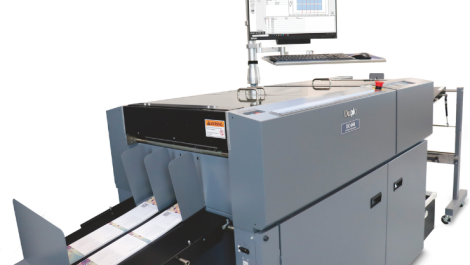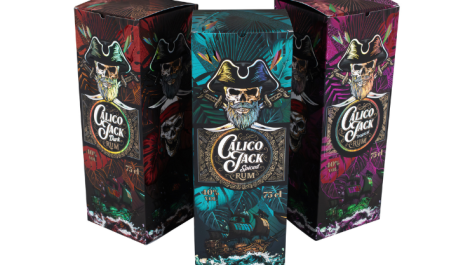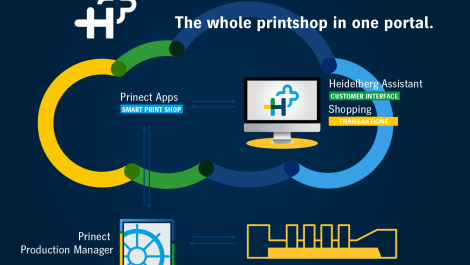Glossop Demo days cartons
The UK’s first Highcon Euclid direct to pack carton finishing machine is up and running in Derbyshire. Simon Eccles saw it in action.
Carton converters are not usually noted for dynamic marketing campaigns. The Packaging Superheroes at Glossop Cartons are refreshingly different. This year they have taken their show on the road with fun graphics and comic-style brochures in a promotional campaign that included advertising, web and mailshot communications and taking stands at both the Birmingham and London Packaging Innovations events.
The promotions were the warm-up act for the official launch of the UK’s first Highcon Euclid ‘direct to pack’ digital carton cutting and creasing machine. This culminated in late October with open days at the company’s factory.
Glossop Cartons has been run by husband and wife team Brian and Jacky Sidebotttom for almost 30 years, and today employs 51 people including an Mrs Sidebottom is proud that like leasing. It’s like running a house – can you afford it? Yes, so you pay for it. You see people losing it all on credit.’
The core production press is a five unit Mitsubishi B1 V3000LC offset carton press, the first in the UK when it was installed in 2009. Last year’s addition was a Fujifilm Acuity LED 1600 inkjet printer, one of the first in the UK. This is used mainly for sample work, together with a Zünd digital cutting table.
Early this year Glossop Cartons was the first company in the world to sign an order for a Highcon Euclid, although it was not quite the first in Europe to receive one – that went to Antilope in Belgium, close to Highcon’s European HQ in Brussels.
‘We went to drupa in 2012 to look at digital, not just the German beer!’ said Mrs Sidebottom. ‘Like everyone else we looked at the Highcon stand and thought ‘that’s the future, but not for us just yet’. So we didn’t give it a second thought.
‘After the show they came knocking on our door and said we were the sort of company that needed Euclid. We saw the samples and went to Plantin (Highcon’s agent for several European countries) and we were blown away. Being a married couple we don’t have to discuss much. I just said to Brian “where are we going to put it?”’
Why did Highcon think Glossop was a good candidate for an early user? ‘We’re a medium sized company with very hands-on directors, very involved in day to day manufacturing,’ she said. ‘You have to work with the machine manufacturer to improve it. It’s when you start using it that you learn and increase your knowledge.’
The Euclid was installed in July, so by October Glossop Cartons had been running both real and test jobs for several months, she said. ‘Since it came in we really haven’t had time to play with it, as we’ve had so many customers wanting to use it. These have mostly been short runs, but there has been one big job, for 35,000 sheets.’ There are two main advantages to the Euclid, she feels. ‘One is basic short runs that mean there’s no need for a cutting forme and no makeready. The other is highly intricate, lacy work that nobody else can do except Antilope in Belgium.’
The open days allowed Glossop’s designers to have some fun with creating their own Halloween themed sample cartons. One of these had scary spider-shaped windows with realistically spindly legs. There were also demo advent calendars with chocolates behind the doors, based on a job lot of Cadbury’s calendars that Glossop bought and re-sleeved. These have very delicate and intricate lacy cuts, which in turn necessitated micro-perfed edges to the doors so they’d be easy to press open without damage.
Mr Sidebottom explained the costing behind short run jobs. ‘A foil with DART polymer costs about £70 to £80 and we were able to do three different jobs on it for the demos, with the same creases but different cuts. Three metal dies would have cost about £350. Creating the creasing sheet for our demo job took about seven minutes, as it was fairly simple. We could do three jobs and three make-readies in 40 minutes.’
Although Highcon was quoting run lengths of about 10,000 sheets for the DART polymer, Mr Sidebottom said that longer runs are possible, citing one of 35,000 done with two DART foils of 18,000 and 19,000. There is no makeready time needed for the laser other than loading the job file. Once running, the speed is as Highcon said, he confirmed. ‘We’ve seen 1500 sheets per hour on it. The sheets don’t stop, the lasers track them. The focus of the beam has to be controlled as it has to shift as the beam moves and the sheet thickness varies. Every sheet is measured and calculated on the fly for variables.’
The Euclid is based in solitary splendour in the new Digital Studio, converted from a long garage. There is room next to it for something else, such as a digital press, perhaps? Mrs Sidebottom is staying non-committal about that so far, though she’s well aware of the digital carton presses that are on the way, such as the Fujifilm Carton Press 720F.
Meanwhile the Packaging Superheroes marketing campaign is continuing. ‘We’ll be at the next Packaging Innovations in February, and we’re already designing the third magazine for that,’ she said. ‘The carton production industry is a bit full of stuffy old shirts who pooh-pooh new technology, but it’s hard to forget Glossop Cartons with our marketing campaign.
We were concerned that the Highcon might look like a vanity purchase, but it’s not, it’s a valuable asset in our business already.’





